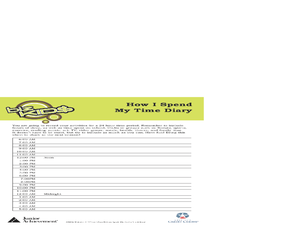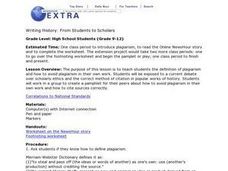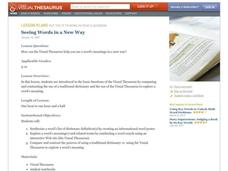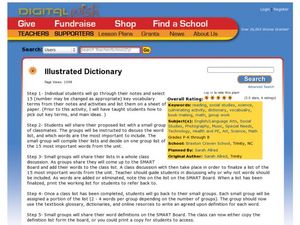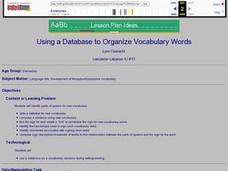Curated OER
Justice for All
A reading of Roald Dahl’s Lamb to the Slaughter opens a discussion of justice and fairness. Using a Venn diagram and an Idea Wheel graphic organizer, class members consider the similarities and differences in these two terms. They then...
The New York Times
Evaluating Sources in a ‘Post-Truth’ World: Ideas for Teaching and Learning about Fake News
The framers of the United States Constitution felt a free press was so essential to a democracy that they granted the press the protection it needed to hold the powerful to account in the First Amendment. Today, digital natives need to...
Scholastic
What’s the Good Word? Etymology Project Guidelines
Who named the shapes, or the days of the week? Should words be removed from the dictionary if they're no longer commonly used? Are there too many words in the English language? Language arts students explore these and additional...
College Board
Evaluating Sources: How Credible Are They?
How can learners evaluate research sources for authority, accuracy, and credibility? By completing readings, discussions, and graphic organizers, scholars learn how to properly evaluate sources to find credible information. Additionally,...
Curated OER
How to Achieve Your Financial Goals
Students explore economics by creating a budget. In this financial goal setting instructional activity, students investigate their use of time by completing a worksheet. Students identify financial goals they would like to achieve in the...
Curated OER
Writing History: From Students to Scholars
An Online NewsHour article about scholarly ethics launches this study of plagiarism. Since historians are supposed to bring original ideas and perspectives to their publications, they must give credit to the ideas of others. After a...
abcteach
Flowers for Algernon, by Daniel Keyes
Looking for materials to accompany your study of Flowers for Algernon, by Daniel Keyes? Look no further! Included here is everything you need to go alongside your unit: worksheets, graphic organizers, writing assignments, an assessment,...
Curated OER
What is a Dictionary?
Second graders explore the purpose of a dictionary. In this library media lesson plan, 2nd graders explore My First Dictionary and identify guidewords, entry words, and captions. Students list ways they can use the dictionary.
Curated OER
Using Context
Teams practice decoding and using context strategies to determine the meanings of unfamiliar words. After verifying the meanings of words through the use of dictionaries, the Internet, thesauruses, and other sources, learners write the...
Curated OER
Dictionaries
Students understand the way the dictionary is laid out as well as the purpose for why people use dictionaries. In this language arts lesson, students recognize the need for alphabetical order and are able to find words using a...
Curated OER
Picture Dictionary
Students write and contribute one page for a class picture dictionary. They discuss how to alphabetize words, and examine both regular and picture dictionaries and how they are organized. Next they create a page for the class dictionary...
Curated OER
Create a Word
Brainstorm new words for a class dictionary. In small groups, young learners read and discuss an article about how words get into dictionaries. They then develop a new word, use it in a sentence, and share their creations with their peers.
Curated OER
Seeing Words in a New Way
What's the best resource to use when looking up words? Use Visual Thesaurus to see a word's meaning. The class accesses the interactive website and then compares and contrasts the difference between using a traditional dictionary and the...
National Endowment for the Humanities
The Beauty of Anglo-Saxon Poetry: A Prelude to Beowulf
Riddle me this! What do kennings, caesura, and alliteration have to do with the Nowell Codex? Introduce class members to Anglo-Saxon poetry and prepare readers for a study of Beowulf with a series of activities that includes asking...
Curated OER
I Wonder How the Manduca Life Cycle Compares To the Human Life Cycle...
Students study life cycles including developing their understanding of the human life cycle. They decide where they are in the human life cycle and provide reasons for that placement. They compare the human life cycle to that of the...
Curated OER
Fairy Dictionary
Use artwork to illicit responses in a writing journal, and then present your class with the short list of key terms provided. Can your learners add any of their own key terms? Segue for a second, and read tales such as Peter Pan or...
One Pot Learning
Reading Comprehension Worksheet
Three annotated passages from Ralph Waldo Emerson's essay on "Nature" provide young philosophers a chance to improve their reading comprehension skills as they gain insight into Emerson's ideas.
Curated OER
Geology: How to Make a Rock
Second graders examine the various kinds of rocks and make a flipbook about them. They draw pictures of the rocks and write several sentences about how each type of rock is made. They discover the differences in the rocks by making...
The New York Times
Revolt! Comparing Historical Revolutions
What elements are needed to have a revolution? How do historical revolutions from across the globe and generations compare with one another? This is an excellent activity that incorporates group work, source analysis, and an engaging...
Curated OER
Illustrated Dictionary
Students make an illustrated dictionary of words they've used and learned in class. In this vocabulary lesson, students find words from their notes, discuss the words in a group, select the best words as a class, and complete an...
Curated OER
Electricity--More Power to Ya!
Fourth graders use research tools to access and synthesize information. They gather and manipulate data using technology. Research and study the components of an electrical circuit. Create a brochure that demonstrates knowledge of how to...
Curated OER
Understanding and Using Root Words to Expand Vocabulary
Middle schoolers engage in a lesson which reminds them that root words indicate the base meaning of a word, and that those roots are found in many different words that have similar meanings. Pairs of pupils use construction paper and...
Curated OER
Synthesis of Information
Locating and synthesizing information is an essential part of the research process but can be overwhelming for many young writers. Eliminate some of the stress and confusion, this resource suggests, by separating these steps. To focus...
Curated OER
Using a Database to Organize Vocabulary Words
Learners use a database as a vocabulary resource during writing/reading. They preview stories and list unknown works into their reading notebooks. Students find the definitions, and enter their words into a database using a teacher...






